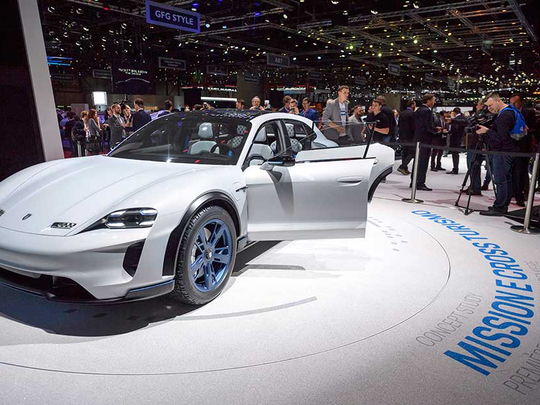
STUTTGART
Porsche pledged to build more variants of its first fully electric sports car, including one based on the recently unveiled Mission E Cross Turismo design, as the Volkswagen AG luxury brand readies for a seismic industry shift to battery-powered models.
Purely electric and hybrid vehicles will account for about a quarter of the division’s global deliveries in 2025, the German manufacturer said Friday at a press briefing. Porsche is set to begin selling the battery-only Mission E sports car in 2019, and it presented the four-door Cross Turismo concept version at the Geneva car show in early March.
VW’s most profitable marque by return on sales, which this year celebrates the 70th anniversary of its first sports car, has embarked on a fundamental overhaul to sustain its industry-leading margins in a time of unprecedented change. Tightening emissions rules have forced carmakers to develop hybrid and fully-electric vehicles, even as demand for the models remains small. Porsche is particularly exposed to the exhaust-gas crackdown, as all of its cars feature powerful engines.
“For the next 10 years, Porsche is banking on three pillars: optimised combustion-engine cars, plug-in hybrid models and purely electric-powered sport cars,” Chief Executive Officer Oliver Blume said in a speech at the Porsche museum near the company’s Stuttgart headquarters. “The world’s regions are developing differently. Therefore we’re preparing to be as flexible as possible.”
Audi Cooperation
Safeguarding Porsche’s profits is vital for Volkswagen because Audi, the division that’s the group’s largest earnings contributor, is wrestling with the fallout from the diesel-emissions scandal that erupted in 2015. That unit has lost ground in both sales volume and profitability to rivals Mercedes-Benz and BMW AG. Porsche and Audi plan to deepen cooperation to reap development-cost savings in the three-digit million-euro range.
Strict spending discipline is needed to offset the “enormous investments” in new technology, Chief Financial Officer Lutz Meschke told reporters. Porsche has doubled its electric-car development budget to 6 billion euros ($7.4 billion) by 2022.
Porsche’s global deliveries reached a fresh annual record in 2017, rising almost 4 per cent to 246,000 cars. Rapid volume growth in recent years has been largely driven by adding the compact Macan sport-utility vehicle to the line-up. Porsche said Friday it aims for “stable” deliveries and revenue this year. Still, the introduction of a revamped version of the Cayenne SUV in China and the US, Porsche’s two largest markets, is set to bolster sales.
Demand for Porsche’s hybrid-car offerings has is promising, with some 60 per cent of buyers of the updated Panamera four-door coupe in Europe opting for the electric-gasoline version. The technology for the next generation of Porsche’s iconic 911 sports car will also allow integration of a battery that could provide extra boost.
Uncertainty triggered by Brexit negotiations is complicating planning for the manufacturer as the UK is an important sales region, Blume said. Volatile markets, economic and geopolitical risks will also require Porsche to expand its hedging against currency fluctuations, he said.












